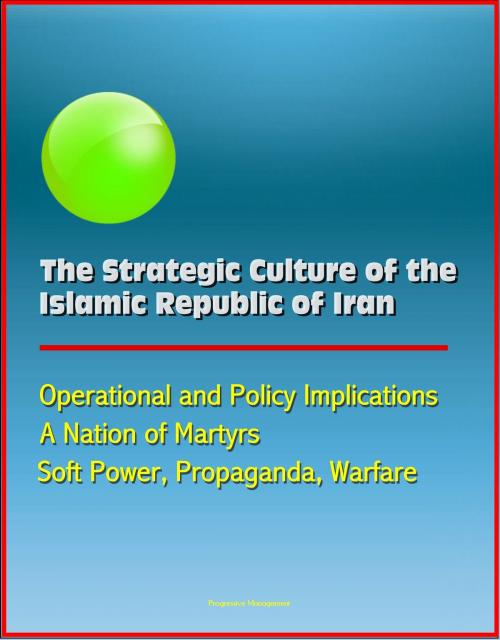The Strategic Culture of the Islamic Republic of Iran: Operational and Policy Implications, A Nation of Martyrs, Soft Power, Propaganda, Warfare
Nonfiction, Travel, Middle East, Social & Cultural Studies, Political Science| Author: | Progressive Management | ISBN: | 9781301711444 |
| Publisher: | Progressive Management | Publication: | January 7, 2013 |
| Imprint: | Smashwords Edition | Language: | English |
| Author: | Progressive Management |
| ISBN: | 9781301711444 |
| Publisher: | Progressive Management |
| Publication: | January 7, 2013 |
| Imprint: | Smashwords Edition |
| Language: | English |
Defining what is the strategic culture of the Islamic Republic of Iran since 1979 is challenging. Its nature is often contradictory and paradoxical and its meaning elusive. It is framed in large part by Tehran's stratagem to confront its adversaries. The foreign policy of the "strategically lonely" Islamic Republic of Iran (IRI) is a byproduct of competition between Islamic universalism and Iranian nationalism. Iran, while feeling threatened by a number of states, including the United States, has ambitions beyond the size of its conventional forces. To address both its perceived threats and satisfy its grand strategic ambitions, Iran relies on armed surrogates, large volunteer forces, a "guerilla navy", strategic rockets and missiles, and soft power.
As part of its mission to broaden U.S. Marine Corps access to information and analysis through publishing, Middle East Studies at Marine Corps University (MES) has established different mechanisms to disseminate relevant publications, including a Monograph Series. The aim of the MES Monograph Series is to publish original research papers on a wide variety of subjects pertaining to the greater Middle East, to include the countries of the Arab world, Israel, Turkey, Iran, Afghanistan, Pakistan and India. The focus of the Monograph Series is on timely subjects with strategic relevance to current and future concerns of the U.S. Professional Military Education community.
The Islamic Republic of Iran (IRI) is an unconventional adversary that requires unconventional approaches in planning, strategy and policy. These approaches must take into account the country's sophisticated culture, the regime's religious-ideological orientation, and the country's modern military history. And they must account for its unique approach to statecraft, strategy, and the use of force.
Iran's political system is characterized by parallel structures that are the locus of multiple power centers. These consist of both traditional and revolutionary institutions: the President and Supreme Leader; the Majles and Guardian Council; the Judiciary and Special Clerical Courts; and the regular military and the Islamic Revolution Guard Corps (IRGC). Due to this organizational complexity and the importance of informal influence networks, the functioning of the regime is often opaque—even to many of its members.
Defining what is the strategic culture of the Islamic Republic of Iran since 1979 is challenging. Its nature is often contradictory and paradoxical and its meaning elusive. It is framed in large part by Tehran's stratagem to confront its adversaries. The foreign policy of the "strategically lonely" Islamic Republic of Iran (IRI) is a byproduct of competition between Islamic universalism and Iranian nationalism. Iran, while feeling threatened by a number of states, including the United States, has ambitions beyond the size of its conventional forces. To address both its perceived threats and satisfy its grand strategic ambitions, Iran relies on armed surrogates, large volunteer forces, a "guerilla navy", strategic rockets and missiles, and soft power.
As part of its mission to broaden U.S. Marine Corps access to information and analysis through publishing, Middle East Studies at Marine Corps University (MES) has established different mechanisms to disseminate relevant publications, including a Monograph Series. The aim of the MES Monograph Series is to publish original research papers on a wide variety of subjects pertaining to the greater Middle East, to include the countries of the Arab world, Israel, Turkey, Iran, Afghanistan, Pakistan and India. The focus of the Monograph Series is on timely subjects with strategic relevance to current and future concerns of the U.S. Professional Military Education community.
The Islamic Republic of Iran (IRI) is an unconventional adversary that requires unconventional approaches in planning, strategy and policy. These approaches must take into account the country's sophisticated culture, the regime's religious-ideological orientation, and the country's modern military history. And they must account for its unique approach to statecraft, strategy, and the use of force.
Iran's political system is characterized by parallel structures that are the locus of multiple power centers. These consist of both traditional and revolutionary institutions: the President and Supreme Leader; the Majles and Guardian Council; the Judiciary and Special Clerical Courts; and the regular military and the Islamic Revolution Guard Corps (IRGC). Due to this organizational complexity and the importance of informal influence networks, the functioning of the regime is often opaque—even to many of its members.















